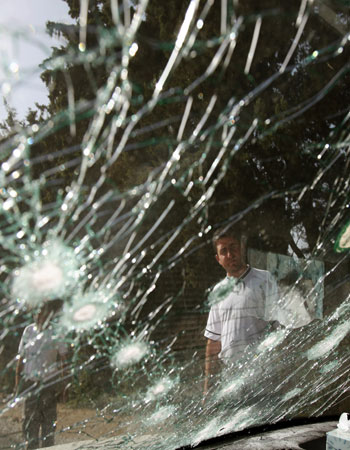
Seen through a shattered windshield, Two Lebanese men look at the wreckage of car that was attacked during an Israeli air raid (AP)
BEIRUT (Reuters) -Israeli forces thrust deeper into Lebanon against fierce Hizbollah resistance on Saturday and air strikes killed up to 20 people, hours after the U.N. Security Council adopted a resolution to end the month-old war.
After the unanimous council vote on Friday, Israel launched an expanded ground offensive in the south, even though Prime Minister Ehud Olmert said he backed the resolution.
But a U.N. envoy said the United Nations expects Israel’s offensive to wind down in one to two days and an expanded international force to begin deploying in a week to 10 days.
“We are not starting from zero… We have building blocks in place as part of stand-by arrangements with a number of countries with earmarked contingents,” Alvaro de Soto, U.N. special envoy for the Middle East peace process, told Reuters in Jerusalem.
Israel expects a ceasefire to take effect by Monday, the Ynet news web site reported, quoting sources in Prime Minister Ehud Olmert’s office.
Relief officials said Israel was still denying permission for aid convoys to reach distressed civilians in the south.
Israeli troops pushed west to Ghandouriyeh, a village 11 km (7 miles) inside Lebanon, their furthest penetration yet, security sources said. Hizbollah said it ambushed them there.
Air strikes in the south killed up to 15 people in the village of Rshaf and four civilians in Kharayeb, security sources said. Raids in the Bekaa Valley killed one civilian.
Israeli bombs also hit Beirut’s suburbs, roads in the north, electricity pylons near Sidon, the Beirut-Damascus highway and the southern city of Tyre, witnesses and security sources said.
The U.N. resolution called for a “full cessation of hostilities” and authorized up to 15,000 U.N. troops to move in to enforce a ceasefire. It said Hizbollah must halt all attacks and Israel must stop “all offensive military operations.”
Lebanon’s cabinet, which contains two Hizbollah ministers, was expected to approve the resolution later in the day.
Olmert will urge his cabinet to approve the resolution at a meeting on Sunday, but an Israeli official said the army would not stop its Lebanon offensive before then.
Hours before the U.N. vote, Israeli aircraft fired rockets at a convoy of hundreds of civilian cars fleeing the south, killing at least seven people and wounding 36, the Lebanese Red Cross said. Israel said the attack was a mistake.
At least 1,061 people in Lebanon and 124 Israelis have been killed in the war that began after Hizbollah guerillas captured two Israeli soldiers in a cross-border raid on July 12.
The planned U.N. force will monitor the withdrawal of Israeli troops and help the Lebanese army maintain a ceasefire.
The resolution stipulates that after fighting stops, Israel must withdraw all its forces from Lebanon at the earliest opportunity, in tandem with a U.N.-Lebanese troop deployment.
It also calls for a zone between the Litani river and the Israeli border “free of any armed personnel, assets and weapons” other than those of the U.N.-Lebanese forces, implying a Hizbollah withdrawal or disarmament.
Hizbollah agreement to this would be a concession that the group had resisted since Israel withdrew from Lebanon in 2000.
But the group will also claim victory. It still holds the two Israeli soldiers it captured and has shown it can survive the onslaught of one of the world’s mightiest armies.
Israel can also claim it has won because the U.N. resolution would secure its goal of removing Hizbollah from the border. The resolution could also make it harder for the group to rearm and it calls for implementation of a U.N. resolution that demands Hizbollah’s disarmament, but does not say when.
Israel says it has damaged Hizbollah much more than its foe acknowledges. Civilians on both sides are the main casualties.
U.S. Secretary of State Condoleezza Rice said she did not expect the resolution to end all violence, adding: “The conditions of a lasting peace must be nurtured over time.”
Aid agencies seeking access to an estimated 100,000 people trapped in the south said the U.N. vote had made no difference.
“We have not got concurrence from the Israeli army on any convoys at all, north, south or anywhere in the country,” said David Orr, spokesman for the U.N. World Food Programme. “Despite the political agreement, we have ground to a halt.”
The resolution empowers the U.N. force, expected to be led by France, to take “all necessary action” to fulfil its mission.
French President Jacques Chirac urged all parties to halt hostilities immediately. British Prime Minister Tony Blair and German Chancellor Angela Merkel also welcomed the resolution.

Israeli soldiers march inside Lebanon near southern town of Markaba (R)

Smoke rises from Khiam village during Israeli air strikes in south Lebanon (R)
